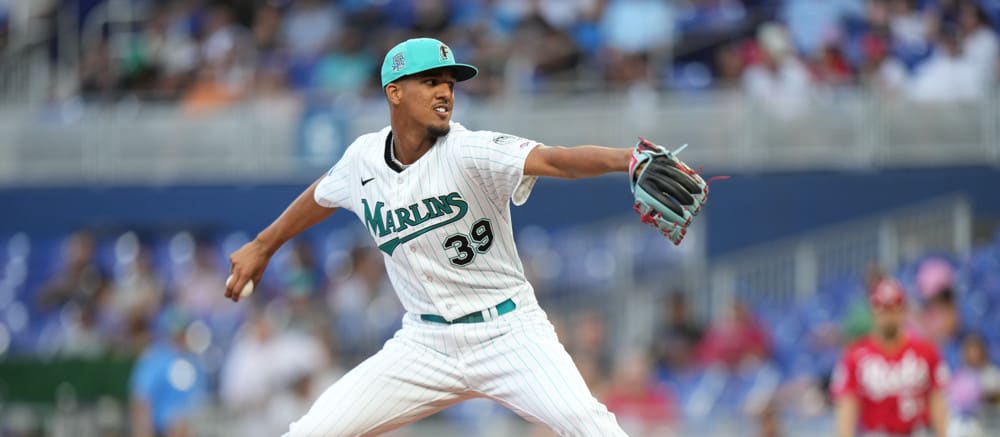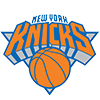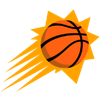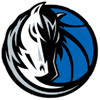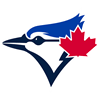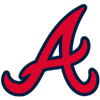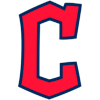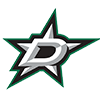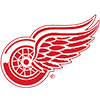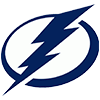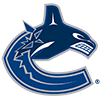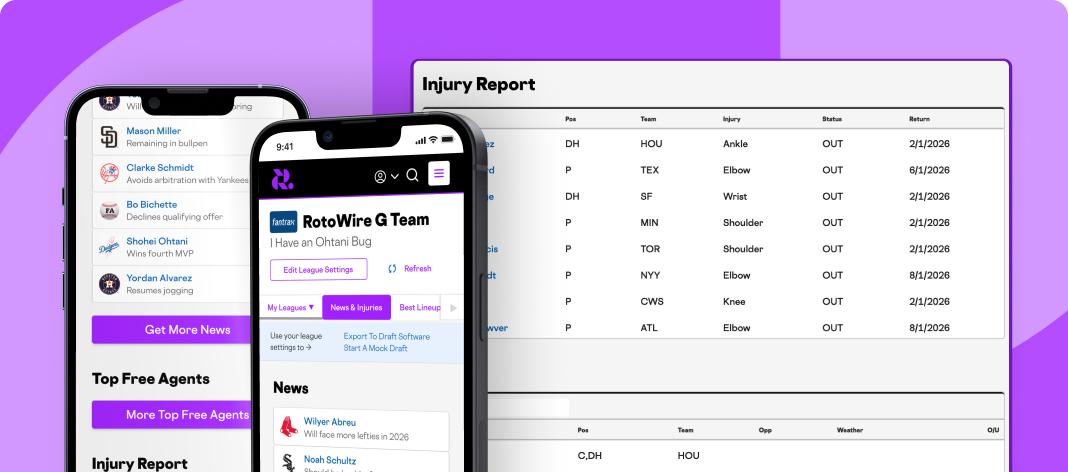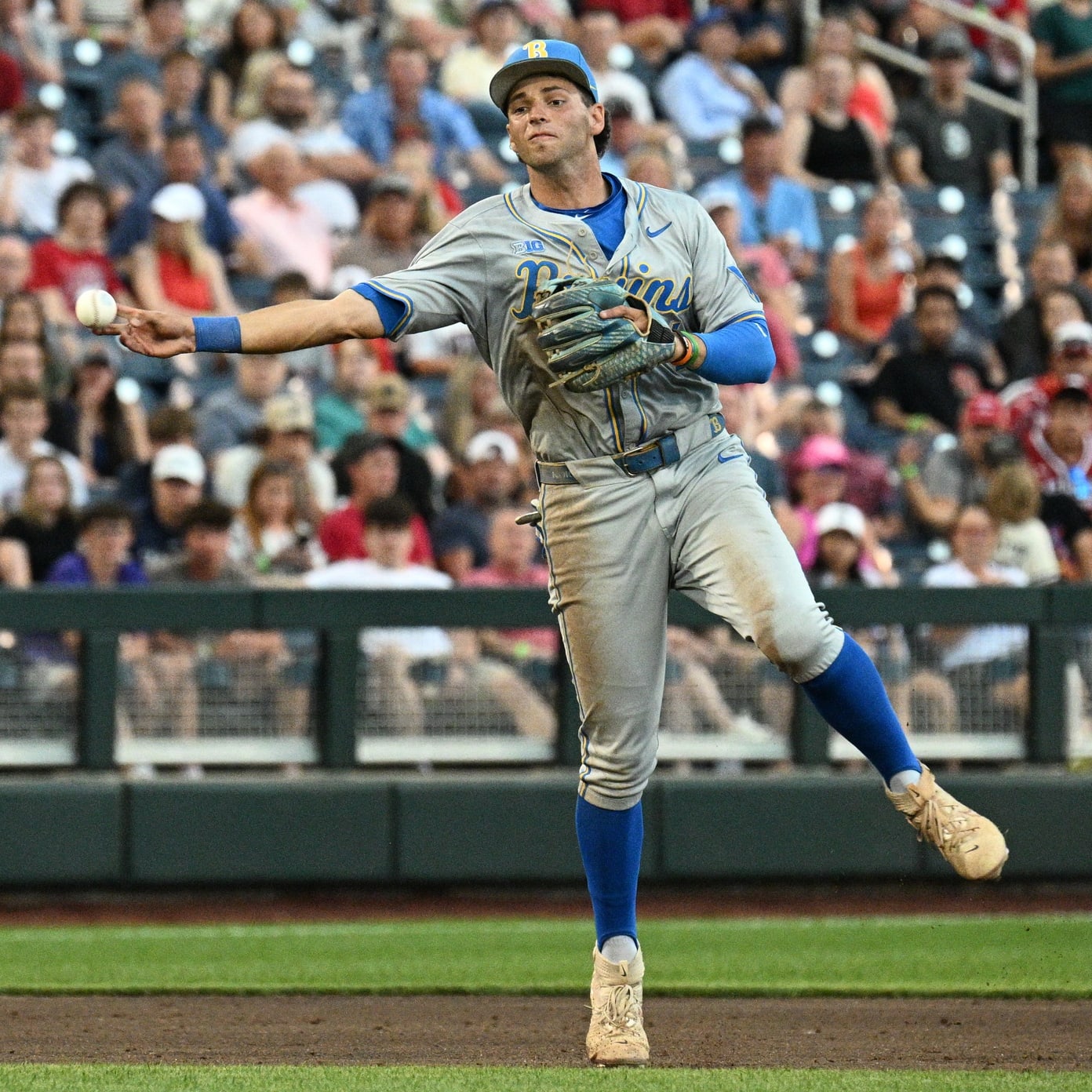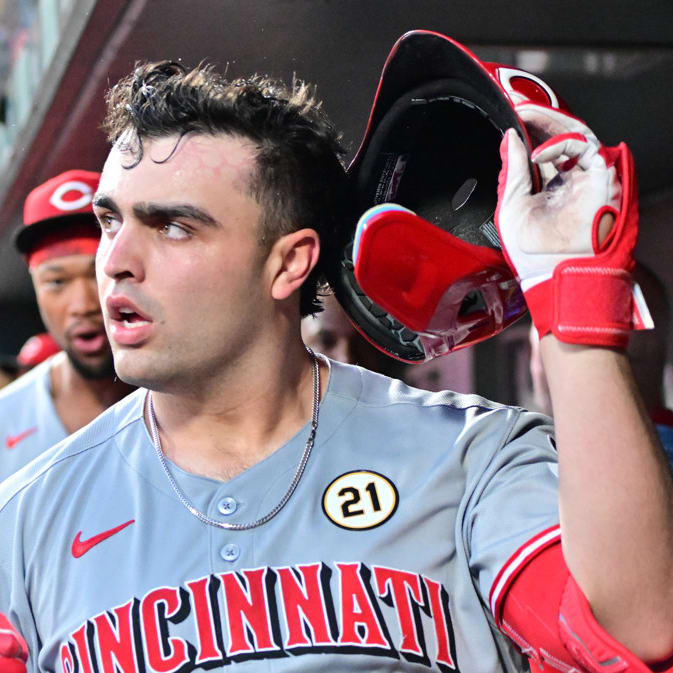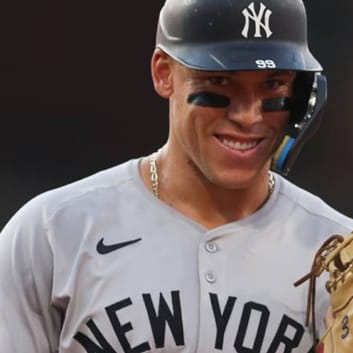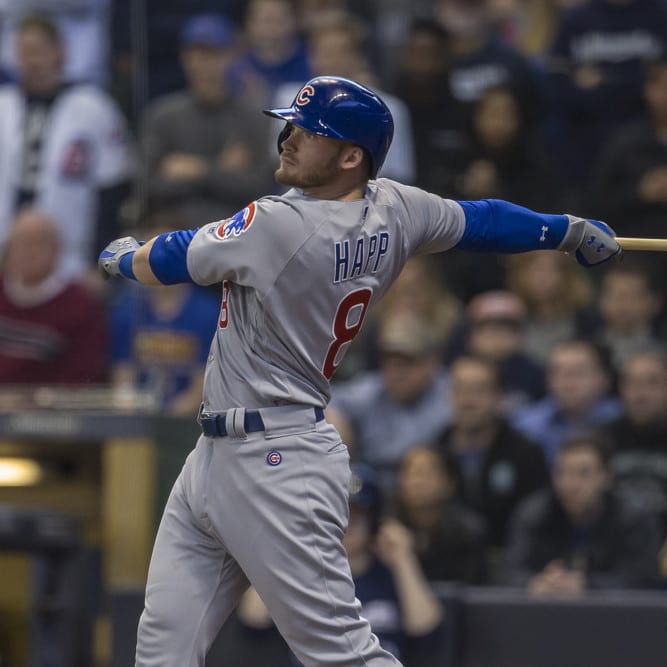I'm going to use the introductory space this week to give an update on my rookie season in NL Tout Wars. Am I doing so this week because the team suddenly jumped up to first after spending most of the first six weeks in the bottom half of the standings? Technically no, because I wrote most of this introduction on Monday, when the team was still sitting in third. In any case, I'll leave the introduction up even if the team tumbles back down by the time this article is published, which is very possible considering how tight the standings have been all year. Still, doesn't this look nice?
Here's a recap of my team from immediately after the draft, and here's how I envisioned my depth chart at the time:
Here's how things look now, with new players in bold:
| Catcher | Corner Infield | Middle Infield | Outfield | Starting Pitcher | Relief Pitcher |
|---|---|---|---|---|---|
| Francisco Alvarez | Paul Goldschmidt | Tommy Edman | Bryan Reynolds | Zac Gallen | Josh Hader |
I'm going to use the introductory space this week to give an update on my rookie season in NL Tout Wars. Am I doing so this week because the team suddenly jumped up to first after spending most of the first six weeks in the bottom half of the standings? Technically no, because I wrote most of this introduction on Monday, when the team was still sitting in third. In any case, I'll leave the introduction up even if the team tumbles back down by the time this article is published, which is very possible considering how tight the standings have been all year. Still, doesn't this look nice?
Here's a recap of my team from immediately after the draft, and here's how I envisioned my depth chart at the time:
Here's how things look now, with new players in bold:
| Catcher | Corner Infield | Middle Infield | Outfield | Starting Pitcher | Relief Pitcher |
|---|---|---|---|---|---|
| Francisco Alvarez | Paul Goldschmidt | Tommy Edman | Bryan Reynolds | Zac Gallen | Josh Hader |
| Rowdy Tellez | Geraldo Perdomo | Lars Nootbaar | Blake Snell | Taylor Rogers | |
| Luis Campusano (IL) | Jeimer Candelario | Nick Ahmed | Christopher Morel | Eury Perez | Hunter Harvey |
| Luis Guillorme | Jason Heyward | Tylor Megill | Jeremiah Estrada | ||
| Corey Dickerson | Trevor Williams | ||||
| Brenton Doyle | Patrick Corbin | ||||
| Bryce Johnson | Eric Lauer | ||||
| Tyler O'Neill (IL) | Vince Velasquez (IL) | ||||
| Jesus Sanchez (IL) | JT Brubaker (IL) |
The team struggled early. Brubaker, who I'd drafted as my fifth starter following a promising spring, underwent Tommy John surgery before throwing a regular-season pitch, and Nootbaar was injured on Opening Day. Morel failed to make the Cubs' Opening Day roster, while Tyler O'Neill was publicly called out by his manager for lack of effort within the first week of the season. (Remember when that's as bad as things got for the Cardinals?)
I wouldn't claim any managerial genius on my part for the team's turnaround, as none of my pickups have been anything close to game-changers (as expected for a 12-team NL-only league). Instead, I'd chalk it up mostly to luck evening out over the course of a long season. Nootbaar got healthy and immediately began contributing, Alvarez got called up much earlier than expected and Zac Gallen bounced back from a pair of mediocre starts to look like one of the best pitchers in the league.
Most exciting, however, were two developments that happened last week but have yet to have much time to impact the standings. Christopher Morel was called up on May 9 and proceeded to grab eight hits in his first five games, while Eury Perez struck out seven in 4.2 innings against the Reds in his MLB debut May 12. I wasn't sure I loved Perez (even as a late reserve-round pick) at the time of the draft, since I doubted the Marlins' urgency in bringing him up, but if he sticks around and has anything close to the season he's capable of, he could wind up being my best pick.
It's a long season, and I could very easily end up back in the bottom half of the standings soon, but I'm encouraged by where things stand as we hit the one-quarter mark. If we can avoid major injuries, getting a handful of weeks with Perez and Morel on the team should help me assess where the team stands as we head into the summer, when trade season will likely pick up. I'm already pretty nervous about my starting pitcher depth chart, as my second through fourth starters on draft day have all been somewhat disappointing, while my fifth and sixth are now injured. More rests on Perez's young shoulders than I'm comfortable with, but I certainly can't complain overall.
Two players from my Tout Wars squad — you can probably guess which ones — make this week's risers list, while another features as a faller, as do two promising young players who have already lost their major-league roster spots.
RISERS
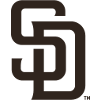 Juan Soto, OF, Padres: I featured Soto here as a faller just three weeks ago, but that came with the following caveat: "I'd trust someone with his hitting instincts to fight through this slump more than I'd trust just about anyone else." It looks like he may have already fought through it. Soto's batting average hit a season-low .178 on April 26, and a big problem seemed to be passivity. Up to that point, Soto had swung at just 53.8 percent of pitches inside the zone, well below the league average of 68.n percent. The result was an outstanding 19.6 percent walk rate, but also an uncharacteristically high 25.9 percent strikeout rate and a 95 wRC+. In 16 games since then, he's hit .368/.507/.684 with three homers, good for a 220 wRC+, and a shift in approach seems to deserve much of the credit. His swing rate on pitches in the zone shot up to 72.5 percent over that stretch, though he's not being blindly aggressive, maintaining a 19.0 percent swing rate outside the zone, third-lowest among qualified hitters over that stretch. The result has been a return to Soto's ridiculous plate discipline marks, as he walked 21.9 percent of the time to go with a 13.7 percent strikeout rate.
Juan Soto, OF, Padres: I featured Soto here as a faller just three weeks ago, but that came with the following caveat: "I'd trust someone with his hitting instincts to fight through this slump more than I'd trust just about anyone else." It looks like he may have already fought through it. Soto's batting average hit a season-low .178 on April 26, and a big problem seemed to be passivity. Up to that point, Soto had swung at just 53.8 percent of pitches inside the zone, well below the league average of 68.n percent. The result was an outstanding 19.6 percent walk rate, but also an uncharacteristically high 25.9 percent strikeout rate and a 95 wRC+. In 16 games since then, he's hit .368/.507/.684 with three homers, good for a 220 wRC+, and a shift in approach seems to deserve much of the credit. His swing rate on pitches in the zone shot up to 72.5 percent over that stretch, though he's not being blindly aggressive, maintaining a 19.0 percent swing rate outside the zone, third-lowest among qualified hitters over that stretch. The result has been a return to Soto's ridiculous plate discipline marks, as he walked 21.9 percent of the time to go with a 13.7 percent strikeout rate.
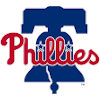 Bryce Harper, DH, Phillies: Harper easily could have earned a spot in this column two weeks ago, as his return from Tommy John surgery in under six months smashed all reasonable preseason expectations, but I was nervous about jumping the gun and calling him a riser only to see him struggle after returning from major surgery without a rehab assignment. But with a player with Harper's superstar track record, it doesn't take long to decide that they're going to be just fine. It's only been 11 games for Harper, but his .326/.396/.535 line with two homers and a steal suggests we don't have much to worry about. There are a few things to nitpick, such as his 27.1 percent strikeout rate, but if we ignore his first game back, when he struck out three times, that mark drops to 22.7 percent, an exact match for his average from his first four years as a Phillie. He's also still clearly capable of making very loud contact, as he's already barreled four balls, good for a 13.3 percent barrel rate. Anything Harper did in May and June is found money for those who drafted him expecting a return around the halfway point, but to see him hitting not just better than average but hitting like Bryce Harper already is remarkable.
Bryce Harper, DH, Phillies: Harper easily could have earned a spot in this column two weeks ago, as his return from Tommy John surgery in under six months smashed all reasonable preseason expectations, but I was nervous about jumping the gun and calling him a riser only to see him struggle after returning from major surgery without a rehab assignment. But with a player with Harper's superstar track record, it doesn't take long to decide that they're going to be just fine. It's only been 11 games for Harper, but his .326/.396/.535 line with two homers and a steal suggests we don't have much to worry about. There are a few things to nitpick, such as his 27.1 percent strikeout rate, but if we ignore his first game back, when he struck out three times, that mark drops to 22.7 percent, an exact match for his average from his first four years as a Phillie. He's also still clearly capable of making very loud contact, as he's already barreled four balls, good for a 13.3 percent barrel rate. Anything Harper did in May and June is found money for those who drafted him expecting a return around the halfway point, but to see him hitting not just better than average but hitting like Bryce Harper already is remarkable.
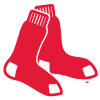 Chris Sale, SP, Red Sox: Sale can be forgiven for being a bit rusty. From 2020 through 2022, he totalled just 11 major-league starts, missing time due to Tommy John surgery as well as multiple other injuries. An 11.25 ERA through his first three starts of this season was a worrying sign, and he had another dud two starts later, allowing five runs in five frames to the Orioles without recording a single strikeout. Since then, however, he seems to have found his groove. In his last three starts, he owns a 2.21 ERA, striking out 24 and walking just two across 20.1 innings. Despite the rocky shape to his season, most of his statline actually looks much like what you'd expect for a former Cy Young contender who's still quite productive in his age-34 season. He's struck out 28.7 percent of opposing batters while walking 6.4 percent, and his groundball rate (40.9 percent) is close to league average. That all adds up to a slew of encouraging ERA estimators, including a 3.41 SIERA, 3.49 xFIP, 3.74 xERA and 3.79 FIP. Sale's 5.40 ERA on the season still looks nothing like those marks, but given the way he's looked in recent outings, it should be down in that range soon.
Chris Sale, SP, Red Sox: Sale can be forgiven for being a bit rusty. From 2020 through 2022, he totalled just 11 major-league starts, missing time due to Tommy John surgery as well as multiple other injuries. An 11.25 ERA through his first three starts of this season was a worrying sign, and he had another dud two starts later, allowing five runs in five frames to the Orioles without recording a single strikeout. Since then, however, he seems to have found his groove. In his last three starts, he owns a 2.21 ERA, striking out 24 and walking just two across 20.1 innings. Despite the rocky shape to his season, most of his statline actually looks much like what you'd expect for a former Cy Young contender who's still quite productive in his age-34 season. He's struck out 28.7 percent of opposing batters while walking 6.4 percent, and his groundball rate (40.9 percent) is close to league average. That all adds up to a slew of encouraging ERA estimators, including a 3.41 SIERA, 3.49 xFIP, 3.74 xERA and 3.79 FIP. Sale's 5.40 ERA on the season still looks nothing like those marks, but given the way he's looked in recent outings, it should be down in that range soon.
 Eduardo Rodriguez, SP, Tigers: Just like Sale, his former teammate, Rodriguez has hit some bumps in the road in recent seasons. He missed the entire 2020 season after a bad case of COVID-19 led to him developing myocarditis, an inflammation of the heart muscle. He returned in 2021 but struggled to a career-worst 4.74 ERA. Last season, he signed with the Tigers but wound up with a 4.05 ERA in just 17 starts, missing nearly half the season due to a personal matter. Expectations were naturally quite low for him as a result this season, but so far, he's smashed them. In eight starts, he owns a 1.57 ERA and 0.79 WHIP, and while an ERA that low naturally involves some good luck in the form of a .209 BABIP and 90.4 percent strand rate, there's a lot to like here nonetheless. Rodriguez's 24.7 percent strikeout rate is solidly above league average (and well above his 18.4 percent mark from last season), but it's his 5.3 percent walk rate that's particularly impressive. The 30-year-old lefty's season line gets even more impressive when considering that he struggled to a 6.30 ERA in his first two starts of the year. Since then, he's allowed two earned runs across six outings.
Eduardo Rodriguez, SP, Tigers: Just like Sale, his former teammate, Rodriguez has hit some bumps in the road in recent seasons. He missed the entire 2020 season after a bad case of COVID-19 led to him developing myocarditis, an inflammation of the heart muscle. He returned in 2021 but struggled to a career-worst 4.74 ERA. Last season, he signed with the Tigers but wound up with a 4.05 ERA in just 17 starts, missing nearly half the season due to a personal matter. Expectations were naturally quite low for him as a result this season, but so far, he's smashed them. In eight starts, he owns a 1.57 ERA and 0.79 WHIP, and while an ERA that low naturally involves some good luck in the form of a .209 BABIP and 90.4 percent strand rate, there's a lot to like here nonetheless. Rodriguez's 24.7 percent strikeout rate is solidly above league average (and well above his 18.4 percent mark from last season), but it's his 5.3 percent walk rate that's particularly impressive. The 30-year-old lefty's season line gets even more impressive when considering that he struggled to a 6.30 ERA in his first two starts of the year. Since then, he's allowed two earned runs across six outings.
 Eury Perez, SP, Marlins: It's only been one start, and he didn't even complete five innings, but I'm including Perez as a riser this week nonetheless. It wasn't clear that he'd be up early enough this season to make stashing him a viable move, as the Marlins aren't exactly famous for prioritizing winning at the expense of money, and the fact that he was sent back to Double-A Pensacola despite making 17 starts there last season didn't seem like a good sign. But after just six more starts in the minors, Perez earned his big-league debut last week, striking out seven Reds and walking two while giving up two runs on four hits (including a pair of solo homers) in 4.2 frames. The Marlins have good rotation depth when everyone is healthy, but if Perez pitches anywhere close to expectations, he'll be up for good. His remarkable height (6-foot-8) and youth (he didn't turn 20 until mid-April) kick his hype into overdrive, but his minor-league track record isn't just "good for a 6-foot-8 pitcher" or "good for a teenager." He's been just good, period, posting a 2.84 ERA and 0.98 WHIP in 44 minor-league starts backed up by a 35.1 percent strikeout rate and 8.1 percent walk rate.
Eury Perez, SP, Marlins: It's only been one start, and he didn't even complete five innings, but I'm including Perez as a riser this week nonetheless. It wasn't clear that he'd be up early enough this season to make stashing him a viable move, as the Marlins aren't exactly famous for prioritizing winning at the expense of money, and the fact that he was sent back to Double-A Pensacola despite making 17 starts there last season didn't seem like a good sign. But after just six more starts in the minors, Perez earned his big-league debut last week, striking out seven Reds and walking two while giving up two runs on four hits (including a pair of solo homers) in 4.2 frames. The Marlins have good rotation depth when everyone is healthy, but if Perez pitches anywhere close to expectations, he'll be up for good. His remarkable height (6-foot-8) and youth (he didn't turn 20 until mid-April) kick his hype into overdrive, but his minor-league track record isn't just "good for a 6-foot-8 pitcher" or "good for a teenager." He's been just good, period, posting a 2.84 ERA and 0.98 WHIP in 44 minor-league starts backed up by a 35.1 percent strikeout rate and 8.1 percent walk rate.
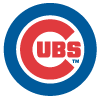 Christopher Morel, 2B/OF, Cubs: I was as high on Morel as you could get during draft season and ended up looking quite stupid when he failed to win a spot on the Cubs' Opening Day roster. I expected his power, speed and defensive versatility to outweigh his contact concerns and lack of a specific starting role, but the Cubs evidently didn't see it that way. If he was sent to the minors for the explicit purpose of improving on his 32.2 percent strikeout rate as a rookie, it's hard to say the move worked, as he struck out 30.6 percent of the time in 29 games for Triple-A Iowa, but he also homered 11 times and stole four bases while slashing .330/.425/.730. It took a hamstring injury to Nico Hoerner to get his chance, and Hoerner's imminent return means there's no guarantee Morel keeps his regular role, but he's doing everything he can to hold onto as much playing time as possible. The strikeouts haven't gone away, as he already has 10 through six games, but they've come with four homers, a steal and a 1.192 OPS. Expect a decline from a true everyday role soon, but four or five starts a week shouldn't be hard to come by as long as Morel hits well enough to deserve them given his ability to play everywhere but pitcher and catcher.
Christopher Morel, 2B/OF, Cubs: I was as high on Morel as you could get during draft season and ended up looking quite stupid when he failed to win a spot on the Cubs' Opening Day roster. I expected his power, speed and defensive versatility to outweigh his contact concerns and lack of a specific starting role, but the Cubs evidently didn't see it that way. If he was sent to the minors for the explicit purpose of improving on his 32.2 percent strikeout rate as a rookie, it's hard to say the move worked, as he struck out 30.6 percent of the time in 29 games for Triple-A Iowa, but he also homered 11 times and stole four bases while slashing .330/.425/.730. It took a hamstring injury to Nico Hoerner to get his chance, and Hoerner's imminent return means there's no guarantee Morel keeps his regular role, but he's doing everything he can to hold onto as much playing time as possible. The strikeouts haven't gone away, as he already has 10 through six games, but they've come with four homers, a steal and a 1.192 OPS. Expect a decline from a true everyday role soon, but four or five starts a week shouldn't be hard to come by as long as Morel hits well enough to deserve them given his ability to play everywhere but pitcher and catcher.
FALLERS
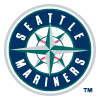 Julio Rodriguez, OF, Mariners: The first six weeks of Rodriguez's sophomore season certainly haven't gone how he or those who drafted him envisioned. His seven homers and seven steals have kept his fantasy value from bottoming out, but his .216/.287/.401 line (94 wRC+) falls far short of the expectations set by his .284/.345/.509 performance as a rookie. Rodriguez has seen modest drops in his barrel rate (from 13.1 percent to 10.9 percent) and hard hit rate (50.7 percent to 45.5 percent), while his strikeout rate has jumped from 25.9 percent to 29.2 percent. The Mariners are seemingly concerned, as he was dropped all the way to sixth in the order last Wednesday after spending the start of the season exclusively batting leadoff. If he remained the No. 6 hitter, it would be a fairly significant blow to his fantasy value, but he's moved back up to third or fourth in the four games since then. Given that he's more of a power threat than an on-base threat, a shift to the heart of the order seems natural, and the early results have been encouraging. He's gone 6-for-20 (.300) with a homer in five games since slipping down the order, though he's struck out 30.4 percent of the time as well, suggesting that not everything has been fixed.
Julio Rodriguez, OF, Mariners: The first six weeks of Rodriguez's sophomore season certainly haven't gone how he or those who drafted him envisioned. His seven homers and seven steals have kept his fantasy value from bottoming out, but his .216/.287/.401 line (94 wRC+) falls far short of the expectations set by his .284/.345/.509 performance as a rookie. Rodriguez has seen modest drops in his barrel rate (from 13.1 percent to 10.9 percent) and hard hit rate (50.7 percent to 45.5 percent), while his strikeout rate has jumped from 25.9 percent to 29.2 percent. The Mariners are seemingly concerned, as he was dropped all the way to sixth in the order last Wednesday after spending the start of the season exclusively batting leadoff. If he remained the No. 6 hitter, it would be a fairly significant blow to his fantasy value, but he's moved back up to third or fourth in the four games since then. Given that he's more of a power threat than an on-base threat, a shift to the heart of the order seems natural, and the early results have been encouraging. He's gone 6-for-20 (.300) with a homer in five games since slipping down the order, though he's struck out 30.4 percent of the time as well, suggesting that not everything has been fixed.
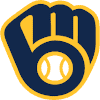 Eric Lauer, SP, Brewers: The success my Tout Wars team has had in recent weeks has come in spite of the fact that my third starter has pitched his way out of the Brewers' rotation. Milwaukee elected to move Lauer to the bullpen last week following three straight starts in which he gave up four runs while failing to throw more than 4.2 innings. The lefty picked up a win in a 5.1-inning relief appearance against the Royals on Sunday and could move back into the rotation soon, but his overall trend remains very much negative. His 4.54 ERA on the season could be considerably worse according to his 5.98 FIP, as he's combined a roughly average 22.9 percent strikeout rate with a poor 10.6 percent groundball rate and a startlingly low 24.8 percent groundball rate. That latter mark has led to him allowing 10 homers already this season, tied for eighth-worst in the league. What makes Lauer's struggles all the more worrisome is that they date back to last season. The last 22 outings of his 2022 season look quite similar to his current numbers, while his hot start to last season looks unrecognizable:
Eric Lauer, SP, Brewers: The success my Tout Wars team has had in recent weeks has come in spite of the fact that my third starter has pitched his way out of the Brewers' rotation. Milwaukee elected to move Lauer to the bullpen last week following three straight starts in which he gave up four runs while failing to throw more than 4.2 innings. The lefty picked up a win in a 5.1-inning relief appearance against the Royals on Sunday and could move back into the rotation soon, but his overall trend remains very much negative. His 4.54 ERA on the season could be considerably worse according to his 5.98 FIP, as he's combined a roughly average 22.9 percent strikeout rate with a poor 10.6 percent groundball rate and a startlingly low 24.8 percent groundball rate. That latter mark has led to him allowing 10 homers already this season, tied for eighth-worst in the league. What makes Lauer's struggles all the more worrisome is that they date back to last season. The last 22 outings of his 2022 season look quite similar to his current numbers, while his hot start to last season looks unrecognizable:
| Period | G | ERA | WHIP | K% | BB% |
| Start of 2022 | 7 | 2.16 | 0.94 | 32.9 | 4.9 |
| Rest of 2022 | 22 | 4.23 | 1.32 | 20.7 | 10.3 |
| Start of 2023 | 8 | 4.54 | 1.44 | 22.9 | 10.6 |
 Hayden Wesneski, SP, Cubs: Wesneski was one of the more interesting pitcher sleepers this past winter, as he'd shown interesting flashes in his 33-inning debut, posting a 2.18 ERA and 0.94 WHIP. He backed up those numbers by being better than average in strikeout rate (25.0 percent), walk rate (5.4 percent) and groundball rate (47.1 percent), making it easier to buy into his small sample. Eight starts later, he's headed back to the minors, with Kyle Hendricks (shoulder) expected to step into his spot soon. After a pair of rough outings to begin the year, Wesneski had actually lowered his ERA to 3.93 following a handful of good outings, but a seven-run implosion against Minnesota on Saturday sent his ERA up to 5.03. He's still managed a strong walk rate (5.4 percent), but his 16.7 percent strikeout rate and 36.0 percent groundball rate represent significant steps in the wrong direction. Wesneski could certainly still figure things out and return to be a productive member of the Cubs' rotation, but his struggles so far serve as a reminder that he wasn't anything special in Triple-A last season, finishing with a 3.92 ERA and 23.2 percent strikeout rate.
Hayden Wesneski, SP, Cubs: Wesneski was one of the more interesting pitcher sleepers this past winter, as he'd shown interesting flashes in his 33-inning debut, posting a 2.18 ERA and 0.94 WHIP. He backed up those numbers by being better than average in strikeout rate (25.0 percent), walk rate (5.4 percent) and groundball rate (47.1 percent), making it easier to buy into his small sample. Eight starts later, he's headed back to the minors, with Kyle Hendricks (shoulder) expected to step into his spot soon. After a pair of rough outings to begin the year, Wesneski had actually lowered his ERA to 3.93 following a handful of good outings, but a seven-run implosion against Minnesota on Saturday sent his ERA up to 5.03. He's still managed a strong walk rate (5.4 percent), but his 16.7 percent strikeout rate and 36.0 percent groundball rate represent significant steps in the wrong direction. Wesneski could certainly still figure things out and return to be a productive member of the Cubs' rotation, but his struggles so far serve as a reminder that he wasn't anything special in Triple-A last season, finishing with a 3.92 ERA and 23.2 percent strikeout rate.
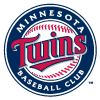 Jose Miranda, 1B/3B, Twins: At a thin third base position this offseason, Miranda looked like a promising target. He didn't show a standout skill at the plate as a rookie but sat in the 63rd percentile in hard-hit rate and 64th percentile in strikeout rate. Being above-average in both quality and quantity of contact led to a .268/.325/.426 slash line (116 wRC+) and 15 homers in 125 games. Unfortunately, the lack of an elite tool combined with the inability to provide much with his glove or legs gave Miranda very little margin for error if his bat took a step back, and he was demoted last Wednesday after slashing .220/.275/.318 with three homers in 35 games. Miranda's strikeout rate actually got even better, dropping from 18.8 percent to 16.2 percent, but his hard hit rate dipped into the 41st percentile. When you don't do anything but hit, you have to hit it hard to find big-league success. Making matters worse for Miranda is the fact that he may not even be the third baseman of the future in Minnesota. Royce Lewis, who's blocked at shortstop by Carlos Correa, is working his way back from his second ACL tear and started a game at the hot corner while on rehab.
Jose Miranda, 1B/3B, Twins: At a thin third base position this offseason, Miranda looked like a promising target. He didn't show a standout skill at the plate as a rookie but sat in the 63rd percentile in hard-hit rate and 64th percentile in strikeout rate. Being above-average in both quality and quantity of contact led to a .268/.325/.426 slash line (116 wRC+) and 15 homers in 125 games. Unfortunately, the lack of an elite tool combined with the inability to provide much with his glove or legs gave Miranda very little margin for error if his bat took a step back, and he was demoted last Wednesday after slashing .220/.275/.318 with three homers in 35 games. Miranda's strikeout rate actually got even better, dropping from 18.8 percent to 16.2 percent, but his hard hit rate dipped into the 41st percentile. When you don't do anything but hit, you have to hit it hard to find big-league success. Making matters worse for Miranda is the fact that he may not even be the third baseman of the future in Minnesota. Royce Lewis, who's blocked at shortstop by Carlos Correa, is working his way back from his second ACL tear and started a game at the hot corner while on rehab.


